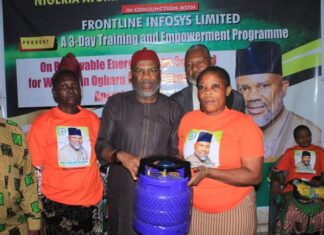The National Film and Video Censor Board (NFVCB) and the Tobacco Control Community have reaffirmed their commitment to a smoke-free Nollywood.
A statement by the Corporate Accountability and Public Participation Africa (CAPPA) Communication Officer, Robert Egbe said NFVCB and the Tobacco Control Community led by CAPPA firmed up the alliance in Abuja during an advocacy visit to the NFVCB office.
The NFVCB’s Executive Director Dr. Shaibu Husseini pledged to implement draft tobacco-control regulations for the entertainment industry, as soon as the document receives ministerial approval. He reasoned that this would help prevent the tobacco industry from continuing to sidestep the ban on tobacco products advertising on television.
The regulations, drafted in 2022 by the tobacco community and the NFVCB, aim to prohibit Tobacco Advertising, Promotion and Sponsorship (TAPS) in movies, music videos, skits, and glamorization of smoking.The tobacco control community is seeking its passage.
The delegation’s team was led by Mr. Akinbode Oluwafemi, Executive Director of CAPPA and Chairman of the Nigerian Tobacco Control Alliance (NTCA).
Also present were NTCA representatives, as well as the in-country coordinator and Associate Director of Capacity Building from CTFK, Mr. Michael Olaniyan.
Husseini unfolded his vision for his office, including a plan to establish a producers/scriptwriters lab for the capacity development of stakeholders in the industry to create further awareness of the NFVCB Act and regulation.
He also proposed a special workshop for the capacity development of producers, directors, and scriptwriters tagged “PDS workshop.”
“The proposed workshop will have in attendance music video directors, filmmakers, and skit makers, the campaign will also seek to curb the unnecessary display of bad habits that are promoted in the entertainment sector.
“The resolution and outcomes from the workshop will be publicized and some of the industry giants will be endorsed as ambassadors of the smoke-free Nollywood initiative,” Husseini added.
He canvassed support from the alliance.
Mr. Oluwafemi emphasized the hazards of smoking on health, noting that globally, countries are “implementing programmes to mitigate tobacco addiction, minimize and/or eradicate the depiction of smoking in the media, including movies save for artistic/ historical expressions which must include a caveat on the dangers of smoking.
“Nigeria, as a signatory to resolutions and conventions adopted at the World Health Assembly to reduce the harmful use of tobacco, has taken significant steps in this regard by enacting the National Tobacco Control Act, 2015, and its offshoot the National Tobacco Control Regulation, 2019.”
He lamented that despite these measures, the tobacco industry persists in finding ways to circumvent the ban on advertising tobacco products on television.
“One notable tactic is leveraging the movie industry to promote their products clandestinely under the guise of artistic expression.
“The board has the power to regulate the use of tobacco in movies even if it is for artistic expression, and some conditions must be satisfied in the cause of filming process.
”Buttressing Akinbode’s position, Mr. Olaniyan of CTFK stressed that “The law is clear on the use of tobacco in movies, subtle advertisements in movies under the guise of artistic/historical expression.
“Historical accuracy, legitimate journalistic or artistic expression needs to satisfy certain conditions which include that the movie is not sponsored by the tobacco industry and warning videos on the dangers of smoking should be displayed at the beginning of the movie and in the cause of depiction of the smoking scene.
“The movie should show the harmful effects of smoking on health. Where it is necessary to depict a smoking scene, the health of other persons on set must be protected and also, such movies should have an age rating.”














